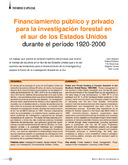Financiamiento público y privado para la investigación forestal en el sur de los Estados Unidos durante el período 1920-2000
ISSN
e-ISSN: 1021-0164Fecha de publicación
01-2002Tipo
Artículo
Metadatos
Mostrar el registro completo del ítemTítulo alternativo
Public and private funding of forestry research in the Southern United States, 1920-2000
Descripción
5 páginas, 2 ilustraciones, 4 tabulaciones, 15 referencias.
Resumen
El manejo de los bosques en el sur de los Estados Unidos se
intensificó durante los últimos 80 años; de hecho, los bosques
de pino de la Llanura Costera se encuentran en las etapas iniciales de domesticación. En 1997, el 57% de las maderas suaves y 52% de las maderas duras producidas en el país venían
del Sur, y los pronósticos dicen que dicha tendencia tenderá a
aumentar durante las próximas tres décadas. La investigación
silvícola sobre mejoramiento de árboles y otros aspectos relacionados con el establecimiento y manejo de plantaciones ha
sido crítica en el proceso de domesticación. La inversión total
estimada en investigación forestal de todas las instituciones en
el Sur fue de $86.8 millones en 1995. Alianzas cooperativas
entre las universidades y la industria fueron creadas para resolver problemas de investigación y aprovechar las ventajas
comparativas de cada uno. Por medio de tales alianzas se logró elaborar o refinar las más modernas prácticas forestales
intensivas de plantaciones, que generaron ganancias significativas en productividad durante los últimos 50 años. La investigación privada y la propiedad intelectual son conceptos
históricamente ajenos a la práctica e investigación forestal en
el Sur. Los avances esperados en biotecnología harán quizá
que las empresas adopten un paradigma de investigación más
competitivo, que incluya patentes, licencias y otros derechos
exclusivos de la propiedad intelectual Forest management in the southern United States intensified over the last 80 years and the pine forests of the Coastal Plain can be regarded as in the early stage of crop domestication. In 1997, 57 per cent of the softwood and 52 per cent of the hardwood timber produced in the country came from the South and forecasts predict increases in harvesting over the next three decades. Silvicultural research into tree improvement and other aspects of plantation establishment and management has been critical to the domestication process. Estimated total expenditures by all entities for forestry research in the South was 86.8 million in 1995. University-industry research cooperatives were organized to overcome shortcomings of industry and university research, and to capitalize on the assets of each. Most modern practices of intensive plantation forestry were either pioneered or refined through these cooperatives, providing significant gains in productivity over the last 50 years. Proprietary research and closely held intellectual property are concepts historically foreign to southern forestry research and practice. Anticipated advances in biotechnology will likely spur companies to adopt a more competitive research paradigm, one involving patents, licenses, and other exclusive rights to intellectual property.
Palabras clave
Editor
Centro Agronómico Tropical de Investigación y Enseñanza (CATIE), Turrialba (Costa Rica)
Es parte de
Revista Forestal Centroamericana, Número 38


